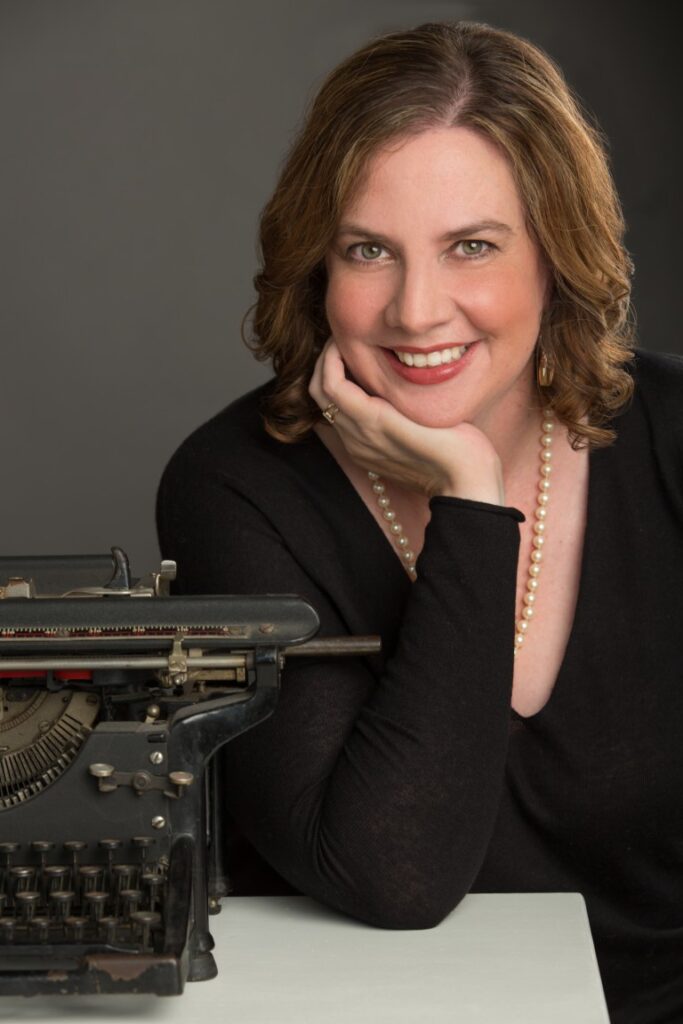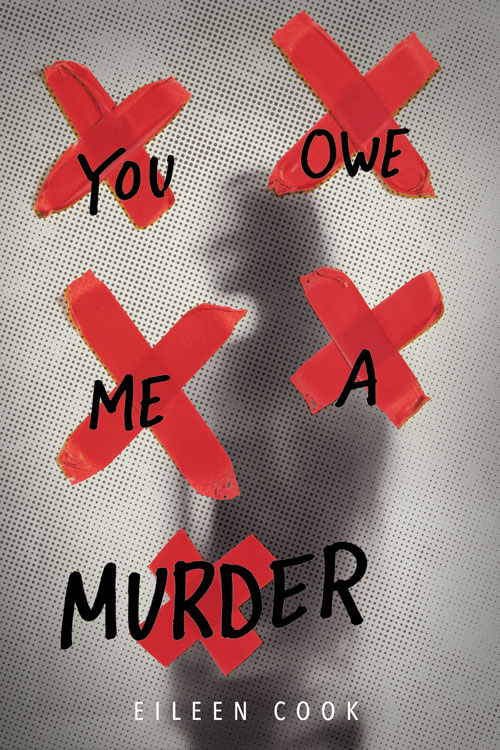In second grade Eileen’s teacher wrote on a homework assignment “I am sure someday you will be an author” which is a tribute to the psychic abilities of elementary school teachers, as well as Eileen penchant for making things up. While she would go on to fill endless notebooks with really bad poetry, short stories, and the occasional start to a novel, she would first go on to pursue a career as a counsellor working with individuals with catastrophic injuries and illness.
Eileen quickly discovered that the challenge of working with real people is that they have real problems and she returned to writing where she could make her characters do what she wanted. Her first novel was published in 2008. Entertainment Weekly called her novel WITH MALICE a “seriously creepy thriller” which pretty much made her entire year.

SE: “You Owe Me a Murder” has been described as a contemporary YA take on “Strangers on a Train.” What inspired you to create this modern twist, and how did you develop the characters of Kim and Nicki?
EC: I love old films and Hitchcock’s are some of my favorites. Then you add in that I also love the writer Patricia Highsmith (she wrote the book the film is based on and The Talented Mr. Ripley) and the chance to explore the concepts raised and how could I not feel inspired?
The idea of how far a person will go when under pressure intrigued me. We like to think we know our boundaries, and what we’re capable of doing, but you often don’t know until you’re pushed. This struck me as something that merited discussion for teens, we talk about peer pressure, but what if that were amplified?
Whenever I start a book, I spend a lot of time considering characters, looking both for who is the best person to put in that situation and the more “woo-woo” answer of seeing who starts speaking to me. Characters come alive in my head before I can capture them on the page.
SE: Kim and Nicki have a complex and intense relationship in the novel. How did you approach developing their dynamic, and what challenges did you face in making their interactions believable and engaging?
EC: Female friendships have always interested me, when they’re good they’re amazing, but when they are toxic….look out. I wanted to create in Kim and Nikki a sense that they need each other. Kim is looking for someone to be strong and to show her how to break out of her own anxieties and fears. Nikki needs an audience. This pulls the two of them together in a very unhealthy dynamic, but because they’re both getting needs met, it also keeps them together.
One of the challenges with writing any character is to not make them all good or all bad. People are complex and layered. Kim is a good person, but she’s also flawed. She doesn’t have the best relationship with the truth at times. Nikki is obviously troubled, but she does have a sense of justice and an inner strength that is admirable. (At least if it doesn’t put her in conflict with you!)
SE: Your novel deals with themes of manipulation, guilt, and moral dilemmas. What message or reflection do you hope readers take away from Kim’s journey and the choices she faces?
EC: Too often I see novels make things black and white in terms of morality. In my experience those situations are easier to navigate, what interests me is when things are murky. We often face situations where there isn’t a clear choice as to what we should do, it gets colored by the people around us who may be offering advice or trying to manipulate your emotions. If readers take something away, I hope it would be that at times life can get away from you. You may find yourself down a path that you didn’t intend. It takes strength to pause, figure out what you really want, and then make choices that move you toward that goal, even when it’s difficult. Listening to your gut is always good advice.
SE: You’ve mentioned that after a difficult period, you redefined your productivity by setting smaller, achievable writing goals. Can you share more about this process and how it helped you regain your writing momentum?
EC: I worked a counsellor for years and specialized in working with people who had significant head injuries, as a result I know entirely too much about how our brains work. One thing our minds will do is look for well-worn neural paths. If you have a belief about something the more often you think it, the more ingrained and worn that path becomes. So, if you think “I can’t write a book” after a while your brain will say “seems to me we can’t do that so we shouldn’t even try.” When I was struggling to write the more often I “failed” by not hitting my larger goals the more difficult it came to get past that. By setting smaller goals (I started with “just open the dang document”) then I had a win. I tricked my brain into thinking “We do hit the goals we set!” Eventually the more often I had success the more I could build on it.

You don’t beat yourself into self-confidence, learning a skill, or writing a novel (or any other large goal.) You must be kind to yourself. Why it is easy for me to be kind to others while being awful to myself is a mystery I’m always working on.
SE: As an author, speaker, and mentor, how do you balance these different roles? What strategies do you use to manage your time and maintain your creative energy?
EC: I love that you think I balance them! We tend to think of balance as a destination. We want to reach balance and then are upset we don’t stay in that place. Balance is much more fickle. We can find balance and then very quickly things can tip back out again. It is something that we must work on all the time, re-evaluating as we go and as situations change.
To help with balance, each week I sit down and determine what are my priorities given everything that might be on my to-do list. I mark off blocks of time in my calendar so I can focus and have space to get work done. I highly recommend the book 4000 Weeks by Oliver Burkman as a way to get yourself organized.
As for creativity- I have long believed that it is both an exhale (getting words on the page, paint on the canvas etc) but also an inhale. To have creative energy you need to consume creative energy. Go to an art gallery, watch a movie, binge a good show, read (of course), have interesting conversations with friends, listen in on conversations by strangers in public places, learn a new skill, take a walk- all are great ways to inhale and give you the oomph to do your own creative work.
SE: Your background in counseling seems to influence your approach to character development. How do you integrate psychological techniques into your writing to create more nuanced and realistic characters?
EC: I am fascinated by this topic, so much so that I wrote a whole book about it, Build Better Characters! My interest in how other people see the world and why they make the choices and decisions they do, is why I went into counselling and what I enjoy about writing. The good news for writers is that psychology and psychologists have done years and years of research into almost every aspect of human behavior. If you’re trying to write realistic characters you don’t have to start at the beginning- you can look at what psychology may teach us.
I believe and teach my creative writing students that it isn’t what happens to us as people, it’s the story people tell themselves about it. One person has a horrible car accident, and they come out telling themselves the story that it was awful, but they survived and now they are going to live each day to the fullest. Another person could have the same accident and decide that the story is that they never have anything go right for them and their life is over because of their injuries. Digging into not just your character’s background, but the story they tell themselves about those events, will allow you to take your characters to a different level.
Interview: SHELF ESCAPE

